By Erin Feitchner, ASCE Pittsburgh Section YMF President
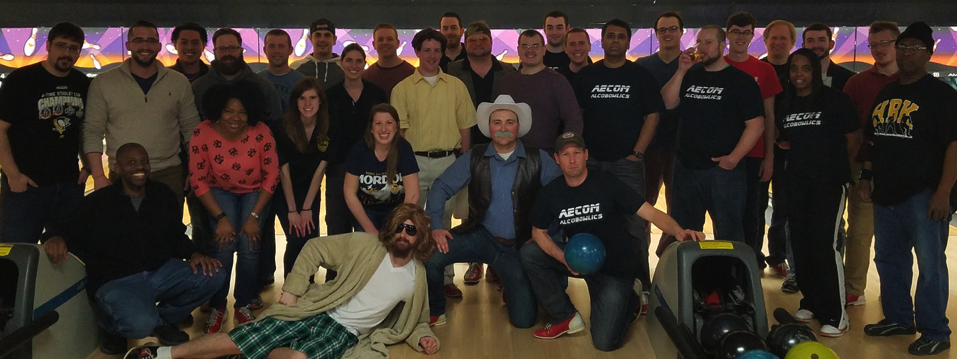 The Pittsburgh ASCE section Younger Member Form (YMF) closed our 2016-17 year in April. This year continued the long standing tradition of providing several events and opportunities for young engineering professionals and students to expand their professional network, gain technical knowledge, and partner with community outreach.
The Pittsburgh ASCE section Younger Member Form (YMF) closed our 2016-17 year in April. This year continued the long standing tradition of providing several events and opportunities for young engineering professionals and students to expand their professional network, gain technical knowledge, and partner with community outreach.
FALLING FOR YMF
In the Fall, we kicked off the year with our annual family picnic at Highland Park where, members and their families enjoyed sunshine and relaxation. This was followed by a partnership with ESWP, SAME, ASHE, EWB, and TauBetaPi for a networking mixer at ESWP. Other networking opportunities for students and young members included the Pirates tailgate and game, a camping trip in Tionesta, PA, enjoying Oktoberfest at Wiggle Whiskey Barrelhouse, and our bowling tournament. These events allow networking in a relaxed setting while helping to showcase businesses and regions within our vibrant city.
DINNER ON THE RIVER
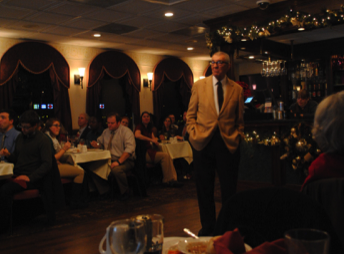 In December we held our YMF annual dinner on the Gateway Clipper, where beloved University of Pittsburgh professor Dr. John Oyler, PE presented on the “Civil Engineering Heritage of Western Pennsylvania.” He discussed the development and significance the National Historic Civil Engineering Landmarks that are in the Western Pennsylvania area, including the survey of the Mason Dixon Line, the PA Turnpike, and Smithfield Street Bridge. Engaging the audience, he provided the perspective from being on the History Heritage Committee for some of the applications and discussed some other significant regional Civil Engineering accomplishments that could be nominated for this honor. Dr. Oyler concluded with a challenge to the young professionals to pick up the torch of engineering advancements and creativity to create future historic landmarks.
In December we held our YMF annual dinner on the Gateway Clipper, where beloved University of Pittsburgh professor Dr. John Oyler, PE presented on the “Civil Engineering Heritage of Western Pennsylvania.” He discussed the development and significance the National Historic Civil Engineering Landmarks that are in the Western Pennsylvania area, including the survey of the Mason Dixon Line, the PA Turnpike, and Smithfield Street Bridge. Engaging the audience, he provided the perspective from being on the History Heritage Committee for some of the applications and discussed some other significant regional Civil Engineering accomplishments that could be nominated for this honor. Dr. Oyler concluded with a challenge to the young professionals to pick up the torch of engineering advancements and creativity to create future historic landmarks.
GETTING FIRED UP IN 2017
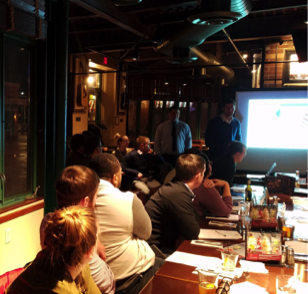 The YMF then rang in the new year at January’s general body meeting which included a highly anticipated presentation on the Sept. 2, 2016 Liberty Bridge Fire and Emergency Repair by Nick Burdette (HDR) and Joe Plummer (PennDOT). Burdette and Plummer discussed the timeline of the fire, assessment, and repair; sharing analysis models alongside details of the complex jacking system used to reset and repair the deformed member.
The YMF then rang in the new year at January’s general body meeting which included a highly anticipated presentation on the Sept. 2, 2016 Liberty Bridge Fire and Emergency Repair by Nick Burdette (HDR) and Joe Plummer (PennDOT). Burdette and Plummer discussed the timeline of the fire, assessment, and repair; sharing analysis models alongside details of the complex jacking system used to reset and repair the deformed member.
FOCUS ON THE FORUM
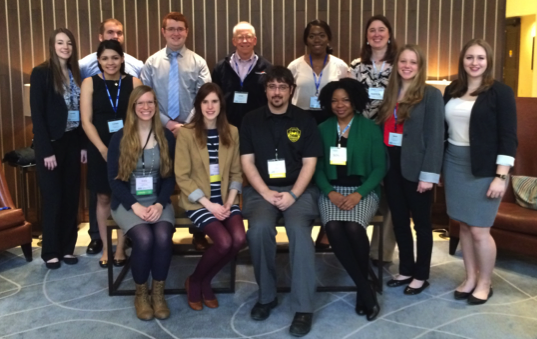 The Eastern Region Younger Members Forum (ERYMC) was also held in January and the YMF sent three members who participated in lectures on ASCE national organization, initiatives, and tips. Events also included practical tips on networking, and a presentation on contract liability language, BEAST. During the annual business meeting a leading vote of abstention was closed on the region’s support towards legislature being submitted in New Jersey this year. This bill would increase the education requirements for taking the PE exam. Additionally, at the ERYMC awards dinner Jeff Jalbrzikowski was recognized for winning the National Outstanding Young Civil Engineer Award in the Public Sector.
The Eastern Region Younger Members Forum (ERYMC) was also held in January and the YMF sent three members who participated in lectures on ASCE national organization, initiatives, and tips. Events also included practical tips on networking, and a presentation on contract liability language, BEAST. During the annual business meeting a leading vote of abstention was closed on the region’s support towards legislature being submitted in New Jersey this year. This bill would increase the education requirements for taking the PE exam. Additionally, at the ERYMC awards dinner Jeff Jalbrzikowski was recognized for winning the National Outstanding Young Civil Engineer Award in the Public Sector.
DREAMING BIG
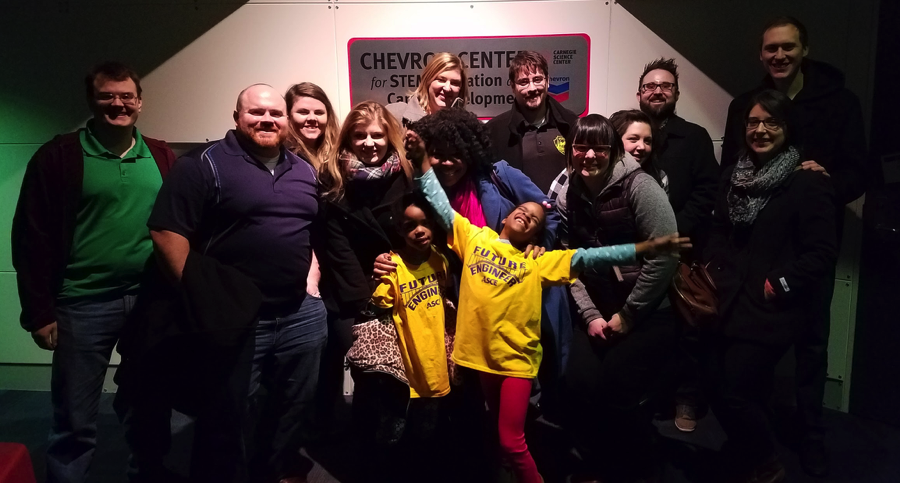 The YMF ERYMC attendees also brought back the excitement of the sneak peek of ASCE’s Dream Big movie and synergized a group of younger members (and a couple kids too!) to attend the Dream Big Premiere at the Carnegie Science Center on February 17. On the topic of the Science Center, the YMF held a casual event at the 21+ night at the Science Center on Construction on April 28, 2017 and where some of the YMF members who missed the Premiere of Dream Big had an opportunity to see it.
The YMF ERYMC attendees also brought back the excitement of the sneak peek of ASCE’s Dream Big movie and synergized a group of younger members (and a couple kids too!) to attend the Dream Big Premiere at the Carnegie Science Center on February 17. On the topic of the Science Center, the YMF held a casual event at the 21+ night at the Science Center on Construction on April 28, 2017 and where some of the YMF members who missed the Premiere of Dream Big had an opportunity to see it.
FIELDING QUESTIONS IN GREENFIELD
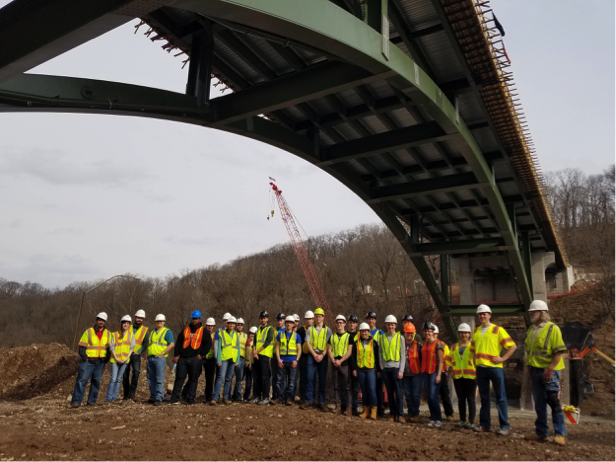 In March the YMF members and students from Geneva College were given a site tour of the Greenfield Bridge. Representatives from Mosites, the City of Pittsburgh, and design firm HDR explained design considerations, construction methods, and answered questions about this historic and publicly identifiable bridge.
In March the YMF members and students from Geneva College were given a site tour of the Greenfield Bridge. Representatives from Mosites, the City of Pittsburgh, and design firm HDR explained design considerations, construction methods, and answered questions about this historic and publicly identifiable bridge.
GETTING SOCIAL
Also in March the YMF started to reach out to members outside of the Pittsburgh downtown area by holding some roaming happy hours. The first social event was held at the South Pointe All Star Sports Bar & grill on March 3. The second was held in Monroeville at the Rivertowne Pour House on March 30. We plan to have one more social event this year in the Uniontown area and to continue to reach out to members in the upcoming year, so if you work or live outside of the city and have a suggestion for a venue please contact our YMF leadership or leave a comment below!
LEADING THE WAY
The Pittsburgh section and YMF supported young professionals in developing their leadership skills with positions within the board and committees and in leadership programs and conferences. The YMF sent members Azekah Giffiths, Emily Eichner, and Scott Duda to the Younger Member Leadership Symposium in August. The symposium brought together over 40 YMF members from across the U.S. Over the course of the weekend, attendees participated in workshops designed to improve leadership abilities, refine communication skills, and identify areas for further personal growth and development. President-elect Erin Feichtner was introduced and participated in the nine-month Leadership Development Initiative (LDI) Pittsburgh. This program brings together emerging young professional from several different industries across the Pittsburgh region. Participants attend lectures one several key elements that help one become an effective leader in work and in community involvement. The program culminates with a PopUp! event in one of the neighborhoods in the Pittsburgh limits where participants work with a community to host a customized event. This year LDI is working with the community of Carrick with the PopUp! event on May 6th.
Throughout the year LDI students lead classes and participated on the ACE mentorship program that introduces high school students to the career opportunities in architecture, construction, engineering, and related areas of the building design and construction industry. This is done by designing mock projects, tour local construction sites, and visit architectural, engineering and construction offices.
THE WINNER IS…
This spring younger member and section director Angela Mayer won the Daniel W. Mead Prize for Younger Members and will receive her award at the National Conference in New Orleans.
We ended the spring similarly to how the year started with a Joint Social with ASHE, CAWP, ESWP, PSPE, SAME, & EWB at Mario’s Shadyside on May 5th.
So what are you waiting for? If you are a Pittsburgh civil engineer under the age of 35, then join the YMF now by contacting Erin Feitchner, ASCE Pittsburgh Section YMF President.
